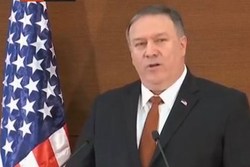 Secretary of State Mike Pompeo has said the United States prefers a peaceful resolution to the crisis sparked by the recent attacks on Saudi Arabia’s state-run oil company.
Secretary of State Mike Pompeo has said the United States prefers a peaceful resolution to the crisis sparked by the recent attacks on Saudi Arabia’s state-run oil company. RNA - "We'd like a peaceful resolution," Pompeo said on Thursday in Abu Dhabi, the capital of the United Arab Emirates, where he held talks with the leaders of the country.
"I hope the Islamic Republic of Iran sees it the same way," he told reporters.
Pompeo dialed back war rhetoric against Iran after Foreign Minister Mohammad Javad Zarif raised the prospect of "all-out war” if the United States carried out a possible military strike against the country.
Asked by CNN what the consequence of a US or Saudi military strike on Iran would be, Zarif said: "All-out war."
"We won't blink to defend our territory," Iran's foreign minister emphasized.
Asked about Zarif’s comments, Pompeo sought to defuse the stand-off.
“I was here in an act of diplomacy. While the foreign minister of Iran is threatening all-out war and to fight to the last American, we’re here to build out a coalition aimed at achieving peace and a peaceful resolution to this,” the US secretary of state said.
“That’s my mission set, what President Trump certainly wants me to work to achieve, and I hope that the Islamic Republic of Iran sees it the same way. There’s no evidence of that from his statement, but I hope that that’s the case," he added.
Pompeo, however, repeated his baseless claims of Iran being behind the attacks on two Saudi Aramco oil facilities on Saturday that knocked out more than half the kingdom’s production.
He also threatened that Washington would impose more sanctions on Tehran.
Pompeo on Wednesday visited Saudi Arabia to hold talks with Washington’s allies in Riyadh where he described the attack on Saudi oil facilities as "an act of war".
He said he was in the Middle East to build a coalition to deter Iran, which denies any involvement in the Saudi attack.
Yemen's Houthi fighters have claimed responsibility for the attack on the Saudi oil facilities, but the United States has rejected the claim with President Donald Trump saying that Iran appears to be responsible for the strike.
Pompeo has put the blame for the operation on Iran, claiming, “Tehran is behind nearly 100 attacks on Saudi Arabia” and that “there is no evidence the attacks came from Yemen.”
Tehran, however, dismissed the allegation, saying Washington seems to be shifting from a failed campaign of “maximum pressure” to one of “maximum lying” and “deceit” against the Islamic Republic.
847/940